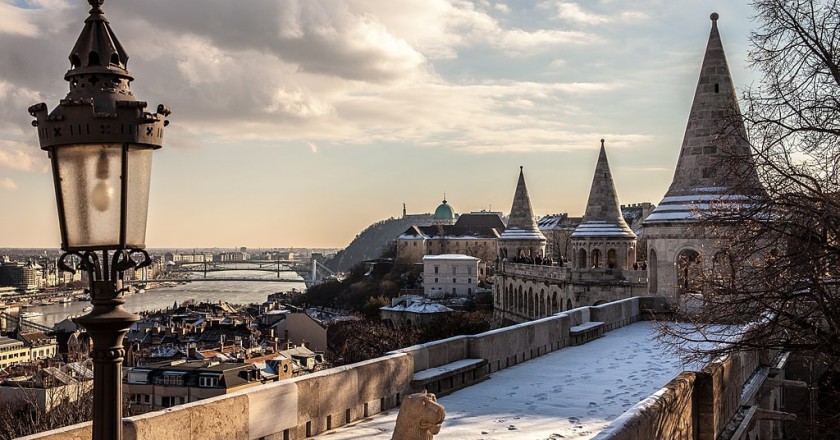Compiled by Hristo Voynov and Eva Jovanova
1. Following a massive civil disobedience campaign in Hungary, the controversial ‘slave law’ which would severely limit worker’s rights has been passed, along with a message calling for protesters to honor a holiday peace. Opposition parties and trade unions promise to continue opposing the law, which has reinvigorated the unity of the opposition within the country. Hungarian PM Viktor Orban has stated that the government will not budge and that violence should not be allowed within the protests, who he claims are funded by George Soros.
2. Kosovo President, Hashim Thaci, and his Serbian counterpart, Aleksandar Vucic, clashed at the UN this Tuesday. The Parliament of Kosovo voted on December 14 to transform the 2.500-member Kosovo Security Force into a national army with double the military personnel and more weaponry. The vote was boycotted by the 9 ethnic Serbs in the Kosovo Parliament and passed nevertheless. At the UN Security Council, Thaci stated that this was a natural step to entrench Kosovo’s sovereignty and that the country should not have waited for this long. Vucic’s statement that followed Thaci’s called for Kosovo’s “curbing and taming” and claimed that he was concerned and afraid of the implications of the Kosovo army.
3. Polish President Andrzej Dudasigned legislature that would allow supreme court judges forced into retirement to be reinstated to their previous position. This was the controversial law that prompted the triggering of Article 7 of the EU against Poland for violating its rule of law obligations because the law was seen as a way of solidifying the ruling party’s hold over the government. This comes just after the ruling party passed a vote of no confidence, which was not a surprise as recent polling shows it continues to be supported by a wide margin.
4. Macedonian and Greek MPs are expected to be nominated for the Nobel Peace Prize for their efforts to reconcile the two countries. The Tunisian economist Uided Bushamaui, a 2015 Nobel Peace Prize winner, claimed that he would nominate them for signing the Prespa agreement, also known as the name agreement. On another “peaceful” note, the Macedonian Parliament passed the controversial Amnesty law earlier this week, giving amnesty to the MPs that aided in storming the Parliament during the 2017 “Bloody Thursday”, a failed coup d’etat staged by now opposition VMRO-DPMNE after which other MPs had to be hospitalized.
5. Russian authorities have made multiple comments on the care of Maria Butina, the Russian graduate student arrested for engaging in espionage in the US. While it is a fact that she was politically active within the US, Russian President Vladimir Putin stated that she was not acting under any orders from the Russian state. Furthermore, he stated any plea deal was the result of her facing 12-15 years in prison, not because she had anything to plea guilty to. Russian diplomats were recently able to visit her, and have complained about her being held in solitary confinement, and her case promises to be a significant issue within the US-Russian relations as a micro battleground in the greater tensions between the two.
6. Albanian Prime Minister Edi Rama was accused of online media censorship this Monday. His office proposed changes in two laws on registration and content policing in online media with the explanation that some media publish biased news, damage public morale and incite penalties. The proposed fines could add up to 8.000 Euros and closure of websites. This initiative was criticized as curbing of freedom of expression and media experts claimed it was unconstitutional.
7. Ukraine has passed a law which would change the name of the Orthodox Church still subordinate to the Moscow Patriarch, with 240 out of 289 MPs voting in favor of it. The new law states that any church which is subordinate to an aggressor state must state its affiliation in its name and that it is not allowed to operate on the front lines of a conflict, which is directly aimed at Russia. This occurs just after the Ukrainian Orthodox Church was established as an independent entity outside of the Russian Orthodox Church.
8. Bosnia and Herzegovina is soon to have a fixed election law that would enable the formation of a new government in the Federation entity. The entity was left without a government since the October’s elections. A financial collapse of the entity could be expected if a new government is not formed by the end of this year. Reforming the law caused much controversy and Croatia’s pressure to reform it as soon as possible was seen by many as interference in Bosnia’s internal affairs.
9. Controversial Slovak businessman Marian Kočner has been accused of using his connections to influence his court case, which was initially over falsifying documents related to payments roughly equaling to €69 million. He is now also accused of using his lawyer to pass notes to members of parliament and his allies within the state security services. While the case is still ongoing, these accusations are not light. They implicate various politicians, which might result in widespread corruption probes in the Slovakian government.
10. Germany’s Minister of Foreign Affairs Haiko Maas announced at the end of last week that Germany and France together would allocate more funds into fighting illegal arms trade in the Balkans. The countries targeted most are Albania, Kosovo, Macedonia, Serbia, Bosnia and Herzegovina, and Montenegro. The main aim of the initiative is to curb the black market in arms in the Balkans and stop the weapons before they reach the European Union. Also, the initiative is supposed to improve small-arms and light-weapons control in the Balkans and to make the public security institutions of these counties more effective by increasing their transparency and cooperation.


0 comments